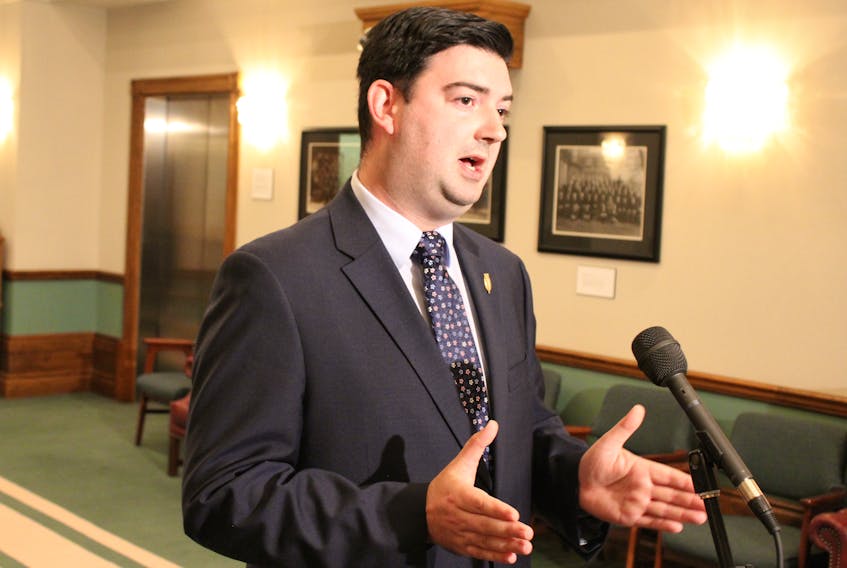ST. JOHN'S, N.L. — After three days of debate and two amendments, there was one confusing moment on the floor of the House of Assembly Jordan Brown won’t soon forget.
The "Mitchelmore Report" was the subject of the final week of a raucous fall sitting of the House. Christopher Mitchelmore, now Advanced Education, Skills and Labour minister, was found by Citizens' Representative Bradley Moss and Commissioner of Legislative Standards Bruce Chaulk to have “grossly mismanaged” his duties regarding the hiring of Carla Foote, daughter of Lt.-Gov. Judy Foote, as executive director of marketing and development at The Rooms without competition, after the position had previously been filled by someone else.
Originally, Government House Leader Siobhan Coady brought forward a motion to have Mitchelmore apologize to the House for his conduct, a punishment similar to what befell former Liberal cabinet ministers Dale Kirby and Eddie Joyce following allegations of bullying and harassment last year.
Opposition House Leader David Brazil had brought a motion to stiffen the penalty by adding two apologies, a meeting with Chaulk to discuss the Code of Conduct, a two-week suspension from the House without pay and the forfeiture of one year of his minister’s salary ($48,664) as punishment.
After some debate, Fisheries and Land Resources Minister Gerry Byrne brought forth his own amendment, which would keep the additional punishments brought by Brazil, except the $48,664 financial penalty.
Byrne said he was worried about the precedent set for applying financial penalties or wrongdoing, considering the potential for abuse of the power by future legislatures.
“If we're to do this, let's look more closely at the issue at hand, and that is the offset of a financial penalty against a member, and arguably a tough one,” Byrne said during debate.
“I will not be one to say that is not a fair consideration, given the fact that there has to be an incentive to better behaviours, but let's be clear about this with each other: this will now be the new norm. We will be setting a precedent and a capacity that will forever guide this legislature for all future events.”
Ultimately, all Liberals and Independent MHA Eddie Joyce agreed, and the sub-amendment passed, 20-19.
Counting votes
In the days leading up to the debate, opposition members had made it clear they did not want to see Mitchelmore remain in cabinet. A previous motion, brought forward by Brown, asked the House to instruct Premier Dwight Ball to remove Mitchelmore from cabinet and re-do the hiring process for Foote’s position at The Rooms.
But the Speaker’s Office ruled that amendment was beyond the power of the motion, and the amendment was not allowed. The financial penalty was seen as a way to force Mitchemore to resign from cabinet, by taking away the additional salary or have him work as a minister on his base MHA salary of $95,357.
Then it came time to vote on the amended Brazil amendment, with the two apologies, one meeting and a two-week suspension still in place.
Because the opposition couldn’t support a reprimand without the financial penalty, Brazil’s amendment passed 20-19, once again. The Liberals and Joyce voted in favour, while the Tories, NDP and Paul Lane voted against.
Then it came time for the final vote on the "Mitchelmore Report." A vote in favour of the motion would see the reduced penalties applied. A vote against would see no penalties for Mitchelmore at all.
When it came time to vote in favour of the motion, the Liberal benches and Eddie Joyce stood in their place. Everyone, except Mitchelmore.
“What happened was, and this is what really upsets me and others, is that Minister Mitchelmore tried to pull a fast one,” said Paul Lane.
“He remained seated in his chair. What his plan was, and he almost got away with it, is that we wouldn’t notice that he didn’t vote in favour of the motion. Then, when we all stood up against it, in sort of protest again, he would stand up with us. Then, we could defeat the main motion, meaning he would get zero punishment. He wouldn’t even have to apologize.”
Lane, whose seat in the House of Assembly gave him a birds-eye view of the Tory and NDP benches, gives Brown full credit for spotting the difference.
“I look across and I see everyone standing up, and I quickly notice that Mr. Mitchelmore was keeping his seat. I talked to my colleague Jim Dinn and said, ‘Mitchelmore’s not standing.’ I did the math and said, someone’s going to have to stand up,” said Brown.
“So, myself and Jim, we sang out to (Barry Petten) and we said Mitchelmore is keeping his seat. So, they motioned to one of their own, Pleaman Forsey, so he got up, and I got up so one of us from each caucus would stand and make sure that the numbers were there so that there is some sort of punishment issued in that situation. If the motion was lost, nothing would happen. We couldn’t bring it back.”
Brown says Lane was shouting for him to sit down for the vote. Lane didn’t catch the difference. Brown is the party whip for the NDP, tasked with ensuring the party is on the same page on voting.
In the moment, Brown realized he was breaking ranks with his party, as Dinn and NDP Leader Alison Coffin kept their seats.
“I actually looked over at Alison and cracked a joke and said, ‘I’m not going to get kicked out of caucus for voting against the party, am I?” said Brown.
The final vote count was 21 for and 18 against reprimand for Mitchelmore.
Minority government math
Brown says the moment shows the growing pains that come with new MHAs operating in the first functioning minority government in the province's history.
"We're in a different House, different minority. There's going to be some quirks and whatnot to everything. We have to find our feet. This is probably one of the most obvious facts of the
minority. We have to quickly do math when we're voting because at this stage in the game, one seat changes everything," he said.
"We're finding our feet, we're moving through the system. Every day is an adventure."
Meanwhile, Lane has written a letter to the Standing Orders Committee of the House of Assembly, which governs the rules of debate within the House, to examine why MHAs subject to reprimand are able to vote on their own fate.
“How can this possibly be, that a member can vote on his own sanction? What some people likened it to would be in a regular court situation, that’s like having the defendant serve on the jury for himself. That makes a lot of sense, when you think about it,” said Lane.
“From my perspective, I believe that absolutely if there’s a member in this type of situation and we’re debating some sort of report, I believe the member has the right to participate in the debate, hear what’s being said and have the opportunity to defend him or herself to his or her colleagues in the House.”
As it stands, the rules of the House of Assembly dictate that if an MHA is present in the House at the time of a vote, he or she should vote. Lane says the committee needs to review whether there’s a conflict of interest for members voting on the consequences of their own actions.
RELATED
- PAM FRAMPTON: Cronyism — the rotten core of Newfoundland politics
- RUSSELL WANGERSKY: Consider this independent review, Mr. Premier
- Mitchelmore apologizes to House of Assembly, will be suspended
- Newfoundland and Labrador House of Assembly ponders punishment for Mitchelmore
- BRIAN JONES: ‘Mitchelmore Report’ unmasks nepotism in Newfoundland
- EDITORIAL: Political patronage rides again
- Premier Dwight Ball denies directing Carla Foote hire at The Rooms
- Newfoundland and Labrador cabinet minister ‘grossly mismanaged’ duties in appointment to Rooms job: commissioner for legislative standards









